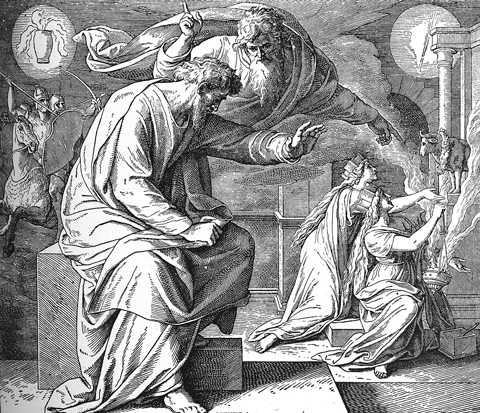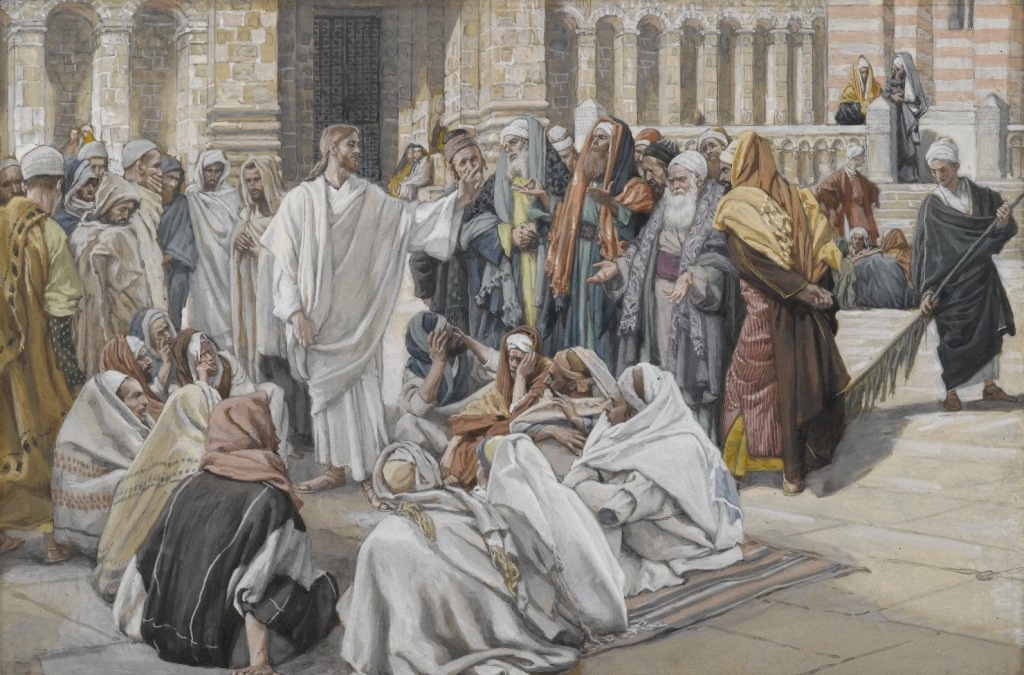In the name of Jesus. Amen.
When we think of rest, we think of it as the opposite of work. Most of the time, rest means we can change into comfy clothes and sweats and sit on a couch or recliner after a long day at work or school. Monday through Friday, rest probably means going to bed at descent time to gain enough strength just so you can get up and get back to work tomorrow and the next day and the next day until the weekend comes. Sadly, many Christians have accepted and adopted the phrase, “Everybody’s workin’ for the weekend.” We’ll work hard for days, weeks, and months to go on vacation – notice how the word ‘vacate’ is the root of the word ‘vacation.’ We vacate our work to visit sandy beaches, cruise ships, or lake cabins where there are no alarm clocks or calendars or to-do lists. Often, rest is nothing more than being inactive or idle. Even though this idea of rest isn’t completely contrary to the Bible – in fact, some of those ideas are right – but the concept of rest in the Scriptures is much fuller and more beautiful than that.
We know that rest is something more than just recuperating from work because the first being to rest in Scripture is God. And He doesn’t need to recuperate! God’s work of creation ends with Him resting on the seventh day. Gen. 2:1-3 says, “Thus the heavens and the earth were finished and all the host of them. And on the seventh day God finished His work that He had done, and He rested on the seventh day from all His work that He had done. So God blessed the seventh day and made it holy, because on it God rested from all His work that He had done in creation.” The Hebrew word translated ‘rest’ there means “cease” or “come to an end,” which has a different nuance than our concept of ‘rest.’ But that word alsohas a specialized meaning of ‘celebrate.’
The first Sabbath day was God celebrating the finish and completion of His work of creating. It wasn’t as though God needed to catch His breath and sit on His Lazy-boy in the clouds to regain strength. No! His work was done, complete, nothing more to do. Everything was in harmony. Everything was ordered exactly the way God intended it to be. God’s rest on the seventh day was His delightful celebration that He had finished His work, and He had done it well.
You’ve probably experienced this kind of rest when you’ve finished a project that has cost you effort, time, and skill. You step back and see that everything is spot on. Imagine the satisfaction of when all the ice and snow is cleared from the cement of your driveway and sidewalk. Or when the house is clean and the meal is spread out on the beautiful table. The job is done, and you have that sweet sense of satisfaction. That’s the idea of rest in Gen. 2, and that’s why God blesses the seventh day and makes it holy.
All of God’s work of creating was moving toward that holy, blessed seventh day of rest. But also, each individual day of creation has hints of moving toward this rest. The picture Gen. 1 gives us is that God works for a time each day and has mini rests each night. But notice how the summary of each day in Gen. 1 is ordered. Each of the six days of creation end with the statement, “And there was evening and there was morning the X day” (Gen. 1:5, 8, 13, 19, 23, 31). The thing you need to notice with that phrase is that each day starts from the time of rest. Evening is mentioned first, then, comes morning. The time of rest comes first. The picture is that God doesn’t get His work in so that He can rest; instead, He works from or out of rest; His work is the fruit of His rest. Then, when the six days are done and everything is complete, God takes a whole day to celebrate and rejoice in His orderly, finished, beautiful creation. God’s rest isn’t Him pulling back from creation. Instead, it’s Him delighting in His creation. He’s celebrating and enjoying everything that He done and accomplished.
Also, think about what the timing of that first Sabbath means our first parents. Adam and Eve were created on the sixth day and were the final two pieces of God’s creation. So, their first full day of existence is the seventh day – the day when God rests. God ordered creation so that He could share His celebration of its completion with mankind. Adam and Eve hadn’t done anything yet. They hadn’t done any work, but they are there to celebrate with God in the ‘very goodness’ (Gen. 1:31) of His complete creation.
This is the background of why God gave us the third Command to “Remember the Sabbath day to keep it holy” (Ex. 20:8). The Sabbath day was established so that you would remember and celebrate the wonder of God and all that He has done. In Ex. 20:8-11, when God first gave the Ten Commandments, He gives a long explanation of why the Sabbath Command exists. It’s the second longest explanation of all the Commandments. The only one that has a longer explanation is the First Command. And God ties the Sabbath Command to the fact that He made the heavens and earth, the sea and all that is in them, and rested on the seventh day and blessed and made it holy (Ex. 20:11). The interesting thing is that when the Ten Commandments are repeated right before Israel entered the Promised Land, God ties the Sabbath Command to something different. God ties it to the fact that He had brought His people out from slavery in Egypt (Dt. 5:12-15). God connects the Sabbath Command to two things: 1) creation and 2) redemption.
So, the Sabbath Command to rest exists so that we can celebrate with God in the goodness of His works of creating and saving every week. God did all the work of creating humanity, and God did all the work of redeeming His people. The people didn’t do anything because they couldn’t do anything. God did everything that needed to be done. So, the point of the Sabbath Command isn’t only to get you to stop working. The point of the Sabbath is so you can sanctify, honor, and celebrate the work God has done for you. That point is so you would delight in the wonder and joy of His creation and His redemption.
After all that, we can get to this text from Hebrews. When our text talks about the Sabbath rest that remains for the people of God, God is promising more than a time for you to physically recover and get back to work. Instead, God is promising that you will rejoice with Him in the abundant gifts He gives. It’s a reentrance into the same rest with God that Adam and Eve had with God before the Fall into sin. This Sabbath rest is delighting in all of God’s works which make and redeem everything so it is all perfect, pristine, and complete.
One of the ways the text highlights this isn’t clear in our translations, but it is clear in the Greek. In v. 9, the text says that a ‘Sabbath rest’ remains for the people of God. In Greek, ‘Sabbath rest’ is a single word sabbitismos, and it’s a word that only appears here in the entire Bible. It’s like the author of Hebrews had to make up a new word to capture all of the meaning of the rest that is in your future. It’s a rest that is greater than all the rest that has come before. Then, in v. 10-11, the text uses a different word that gets translated as ‘rest’ three times. The word is katapausis. You can hear in it the word ‘pause’ and the ‘kata’ at the beginning just amplifies it. It means a ‘complete stop’ or a ‘full stop.’
Dear saints, your Sabbath rest is full and perfect because it is found in the perfect restoration that Jesus has worked and won for you. By His death and resurrection, Jesus has completely redeemed you. And because of His work, you are a new creation (2 Co. 5:17).
This Sabbath rest, this full stop, is something you have to strive after. You have to strive after it because you aren’t God. Because God is eternal and all-powerful, the reason for His rest is different than yours. Sharing in God’s rest isn’t about recovering after work. Instead, it’s the pure delight of being exactly what you are created and redeemed to be.
You have to strive to enter this rest because you want to be your own god and master. And you’ll never have God’s rest if you think that you are your own master and that everything depends on you. That kind of independence is actually horrifying because it requires and demands constant vigilance, work, and activity. Stop deluding yourself! You aren’t in control or responsible for everything. God is. Strive to let go of your need to control your corner of creation because you’ll always need to control a little more. And you can’t. Instead, be still (cease) and know that He is God (Ps. 46:10).
You enter God’s Sabbath rest by hearing His living and active Word. In John 6, Jesus is asked by a crowd point-blank, “What must we do to be doing the works of God?” In other words, “How can we strive to please God?” And Jesus responds, “This is the work of God, that you believe in Him whom He has sent” (Jn. 6:28-29). So, let’s drive all of this home:
There is a Sabbath rest for you, people of God (Heb. 4:9). This rest is yours now, but it is also a future promise. It’s yours now because God the Father has finished His work of creation. And God the Son has finished His work of saving and redeeming you. But the permanent possession of that rest is still in the future. God the Holy Spirit keeps working on you through God’s Word. That’s why you need to strive and work to not fall into the disobedience of unbelief and of giving up faith in God’s promises. You need to strive to give up on trying to be your own master. You need a full stop. And how do you get that?
Well, you come here. You begin each week in the rest that is yours right now. You come into this sanctuary where Christ is (Mt. 18:20). By coming here, you receive what He promised in Mt. 11:28, “Come to Me all you who labor and heavy laden, and I will give you rest,” or, more literally, “I will rest you.” And it is from that rest that you are strengthened to go out from here and live your life day after day, week after week. You go back into creation after celebrating the fullness and completion of God’s work in you. You go back to your vocations knowing that God is in control, knowing that He is busy completing the good work that He began in you (Php. 1:6).
This place is truly a sanctuary. It’s a holy place where holy people meet with the holy God. From Him, and from Him alone, you receive the full stop from your futile works of trying to claw your way back to God. And always, we look forward to the day when we will forever enter into God’s rest and joy and celebration of His redeemed and sanctified creation. May that day come soon. Come quickly, Lord Jesus (Rev. 22:20). Amen.
The peace of God, which surpasses all understanding, will guard your hearts and minds in Christ Jesus (Php. 4:7). Amen.










You must be logged in to post a comment.